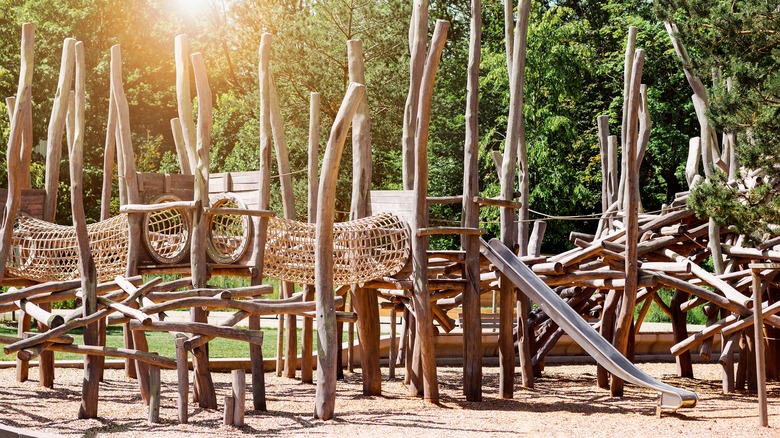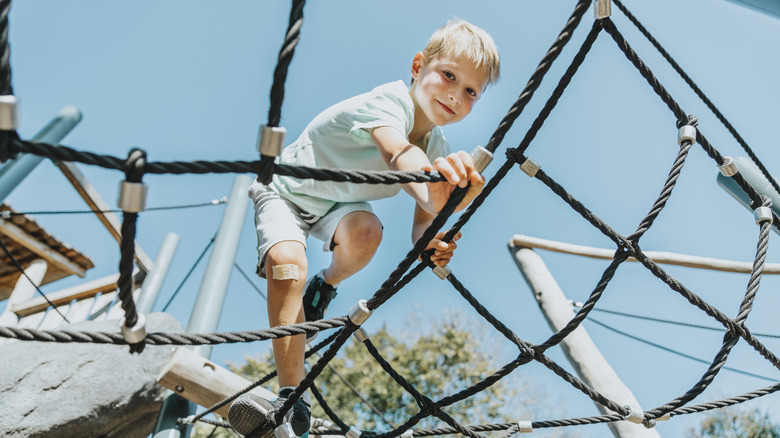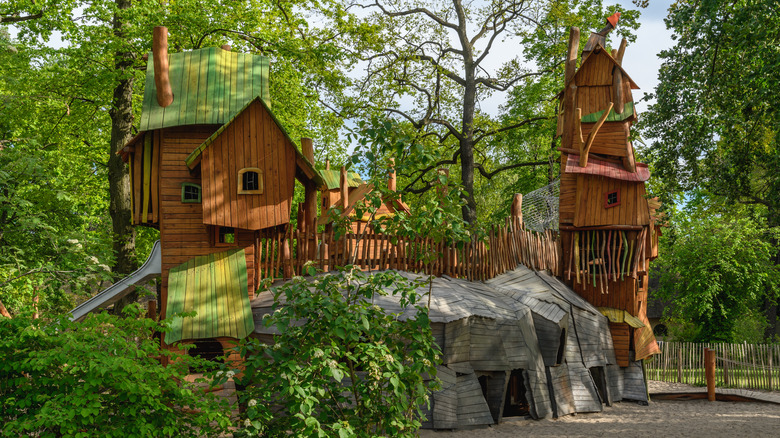Why Tourists Should Be Cautious When Letting Kids Play At Playgrounds In Germany
Germany is a country that values law and order. As the clichéd German adage goes, "Ordnung muss sein," or "there must be order." The country has some unusual regulations like fines for killing bugs, a ban on keeping cremation urns at home, and making it illegal to run out of fuel on the Autobahn. However, there is one place that is devoid of this: The children's playground. German playgrounds are a bit different from the playgrounds you're used to in North America — plastic, safe, sterile, and, frankly, quite boring. While German playgrounds are well-designed and full of fun, they can surprise tourists traveling with children who are accustomed to a more cautious approach to playground safety.
German playgrounds are built with a philosophy that encourages children to learn how to manage risks. You'll notice that many of these play areas include tall climbing structures, wooden platforms, ropes, and natural elements like rocks or logs. In Germany, the idea is that kids should learn to assess and navigate risks on their own, which means dealing with higher slides, climbing frames with gaps, and traversing uneven surfaces. A 2004 study published in the German Journal of Sports Medicine indicates that if kids improve their motor skills on the playground early on, they will suffer fewer accidents when they get older. Tourists visiting Germany should be aware that their children may not be as used to such adventurous playground setups — that said, the challenge might be worth the risk.
Emphasis on risk and independence: Cultural differences
German playgrounds do meet safety regulations — which are certified by the TÜV ("Technischer Überwachungsverein" or Technical Inspection Association) and their trained playground inspectors — but the parameters of these regulations might differ from those in other countries. While parents from the U.S. might be used to playgrounds with rubberized flooring and enclosed play structures, German playgrounds use sand, gravel, or grass as ground cover. Also, not all playgrounds in Germany have safety barriers around high platforms or steep tree-high climbing walls. How else will kids learn that there is a consequence to falling? After all, the ground is hard, not a soft, spongy cushion.
Another factor to consider is cultural differences in how playgrounds are supervised. In Germany, it's common for parents to take a more hands-off approach, allowing their children to explore and play independently so they can develop more robust risk management and self-reliance in those pivotal early childhood years. For example, kids are encouraged to walk or bike to school on their own by first grade (and learn how not to make this dangerous mistake), play alone in the city's adventure playgrounds, and go outside whether it's rain or shine. It's important to recognize that this relaxed supervision style doesn't mean that parents are neglectful — it's simply a cultural difference.
How to be prepared for the German playground
To ensure your kids can join the fun and still have a safe experience at a playground in Germany, it's essential to come prepared. Pack comfortable, sturdy shoes for your children, as many playgrounds feature rugged climbing structures and uneven surfaces. Basic first aid supplies, like bandages and antiseptic wipes, can be helpful in case of minor scrapes and boo-boo moments. Check the weather before you head out, and bring appropriate gear like sunscreen, hats, or raincoats to handle Germany's often unpredictable weather. Nurturing supervision — especially with younger kids who haven't had much experience with adventurous playgrounds — is important, so plan to stay nearby to support your child in their explorations. Truly, the one destination in Germany that is actually dangerous is its train stations, not the playgrounds.
Luckily, Germany is chock-full of these playgrounds, so no matter where you are with your kids on your trip, one will be nearby. AVENTURA in Medebach, one of the biggest playgrounds in the country, has a wide variety of play equipment for all ages, including obstacle courses, slides, climbing frames, and more. Fairytale Playground in Berlin is a stunning play area surrounded by trees that features a storybook-style castle, a small fairytale village, a tube slide, swings, a cable car, and climbing walls. You'll find Wasserspielplatz Westpark in Munich, Alla hopp! in Schwetzingen, and Grasbrookpark in Hamburg, among many others. They all come with their own unique equipment designs, play features, and attractions. The best thing about these playgrounds? They are all free.


